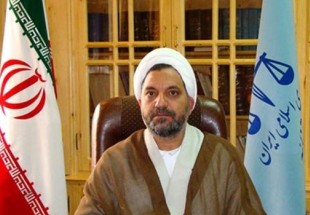
Rasa News Agency reports - "The Jeish al-Adl terrorist group has had no formal demand from Iran," General Director of Sistan and Balouchestan's provincial Justice Department Hojjatoleslam Ebrahim Hamidi told FNA in the provincial capital city of Zahedan today.
Meantime, the official stressed that Jeish al-Adl is a terrorist group and its demands are "illogical".
His remarks came after Iran confirmed that Jeish al-Adl has executed one of the five border guards.
“Based on investigations, the report that one of the five Iranian border guards has been martyred is confirmed,” Deputy Governor-General of Iran’s Southeastern province of Sistan and Baluchestan Ali Asqar Mirshekari said on Monday.
Informed sources in Pakistan told FNA on Monday that "Jeish al-Adl has martyred one of the kidnapped border guards".
The report came after Jeish al-Adl claimed on its tweeter page that it has killed Jamshid Danayeefar, one of the kidnapped border guards.
In relevant remarks on Sunday, an Iranian official said that efforts and consultations with the Pakistani officials still continue to secure the release of the border guards.
"Talks with national and local Pakistani officials have been held at different levels and they have made some promises," Governor-General of Sistan and Balouchestan province Ali Awsat Hashemi told FNA.
He expressed the hope that the young border guards would be released to return to their families soon.
The five Iranian border guards were abducted in Jakigour region of Sistan and Balouchestan Province on February 6 and taken to Pakistan.
Jeish al-Adl terrorist group later claimed responsibility for their abduction.
The terrorist group released a photo of the kidnapped border guards on its Tweeter page and claimed the responsibility for their abduction on February 8. Earlier reports had already revealed that the abducted soldiers had been transferred to Pakistan which has a long border with Iran in the Southeastern parts of the country.
On February 11, Iran called on Pakistani officials to arrest and extradite the members of the terrorist Jeish al-Adl group.
“Unfortunately, we are witnessing the abduction of 5 Iranian border guards by the terrorist groups,” Foreign Ministry Spokeswoman Marziyeh Afkham said in her weekly press conference in Tehran at the time.
Afkham elaborated on the measures taken by Iran in pursuit of the fate of the 5 border guards, and said Tehran's officials have paid visits to Pakistan, summoned Islamabad’s ambassador to Tehran to the foreign ministry and called for the country’s serious action to control the border regions.
“We also want them to identify the abductors of the border guards and extradite them to the Iranian officials and we are ready to cooperate with Pakistan to establish security at the borders and fight outlawed and terrorist groups in Pakistan,” she underlined.
On February 9, Iran’s Police Chief Brigadier General Esmayeel Ahmadi Moqaddam voiced concern over the presence of terrorist groups in Pakistan's territories, and underlined that Iran's police along with the Foreign Ministry are resolved to do their best to clear the fate of the five Iranian guards.
Ahmadi Moqaddam criticized the performance of the Pakistani government and its border police in areas close to Iran.
The Islamic Republic has asked Interpol to prosecute those behind the abduction.
Meanwhile, Iranian and international activists have launched a campaign known as “Free Iranian Soldiers” on social media websites, calling for the release of the border guards.
Iranian President Hassan Rouhani has called for an investigation into the incident, tasking the Foreign Ministry with taking the necessary measures to implement a border security agreement with Pakistan.
Iran has repeatedly called on Pakistan to comply with the terms of the agreement.
On February 15, Iranian Interior Minister Abdolreza Rahmani Fazli held Pakistan accountable for the kidnapping of the five Iranian border guards.
On October 25, 2013, Jeish al-Adl killed 14 Iranian border guards and wounded six others in the border region near the city of Saravan in Sistan and Balouchestan.
In February 2013, Iran and Pakistan signed a security agreement under which both countries are required to cooperate in preventing and combating organized crime, fighting terrorism and countering the activities that pose a threat to the national security of either country.